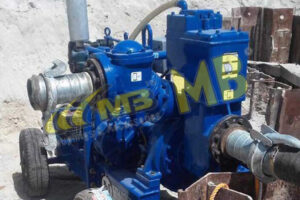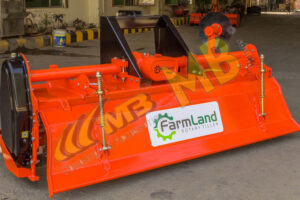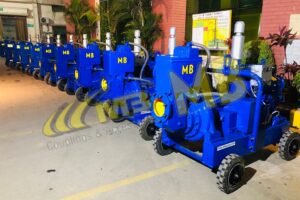The days when manual digging, ploughing, and tilling were commonplace in the agricultural industry are long gone. The invention of machine-driven implements that facilitate land preparation was a revolutionary start to the new phase of agricultural farming, bidding farewell to all the backache, mental and physical burden caused by manual work that was done in the agricultural farm; the introduction of the rotavator is one such development.
By avoiding and controlling pest invasion and crop diseases, rotavators are motorised machines that employ spinning blades to prepare the field and give the best soil condition. A multipurpose farm tool like the rotavator, which mechanically pulverises, cuts, mixes, and levels the soil in a single pass, is required for this soil manipulation and preparation.
The success of this technique successfully ensures the survival and consistency of the crop to be planted, improves the conditions of the soil, water, and air, and makes it easier to conserve soil. However, rotavators come in a wide range of types that can be used based on the power source, soil type, and size of the area.
A rotavator serves a variety of functions.
Punjabi farmer Harindar Seth turns the dirt on his property with a rotary tiller that is connected to a four-wheel tractor. Manav Sherawat, who is in charge of building a road on the outskirts of New Delhi, employs a different kind of rotavator or rotary tiller. Roshni Bhalla of Hyderabad uses a small self-propelled rotary tiller for her domestic garden, which needs to be tilled before planting a crop.
Rotavator Assembly:
This motorised device has a variety of uses and hence performs a number of different tasks. In order to comprehend the relevance of rotary tillers, we must first delve into the nuances and comprehensive breakdown of its numerous elements and their individual responsibilities.
Several parts make up a rotavator, including:
- Independent top mast
- Single or multi speed gearbox
- Chain or gear cover part flange
- Blades
- Cardan shaft
- Rotor shaft
- Trailing board
- Frame and cover
- Adjustable depth skids
- Offset adjustable frame
The independent top mast is used to transmit power from the tractor Power Take-Off (P.T.O) to the input rotavator shaft. The rotavator is categorised as either an engine-operated or tractor-drawn rotavator, depending on the source of power. Through the blades and tines attached to the power driven shaft, earth and garbage are cut. The blades are a rotavator’s main part since they propel the machine while preparing the seedbed and mixing the leftover soil. These blades are often L-shaped because they effectively destroy weeds and serve their intended purpose. The rotavator can be simply modified to meet a farmer’s needs. It is possible to control the location of the back cover and the level of soil pulverisation. The distance between the dirt and the blade can also be changed using the depth skids. You can check-out Best quality Rotavator & Super seeder here.
Use of Rotavator:
Compared to typical tillage methods, quick seed bed preparation and lower draught. By using rotary tillers, field preparation takes 30% to 35% less time and effort than it would with traditional cultivators. Rotavators are a permanent fixture on every farm, regardless of size, thanks to improved work quality, less fuel use, and lower operating costs. able to be applied to both main and secondary tillage. The maximum amount of nutrients are delivered to the crops by a rotavator, increasing agricultural productivity and, ultimately, revenues. It is useful and essential to farming since it may be used for a variety of tasks, including weed control and shallow cultivation. As it also increases soil porosity and aeration, it can be utilised in soil of any texture. Many crops, including sugar cane, cotton, and bananas, to mention a few, can be grown using it. This power-operated tool is simple to use, which helps to make the entire procedure simple and manageable in addition to keeping the soil’s moisture and minimising the labour and dexterous work that previously went into preparing the soil. The rotavator is a necessary item in today’s society due to the various rotary tiller models and their varied uses.
Types of Rotavator:
The rotavator is a flexible piece of equipment used in both primary and secondary tillage, making it appropriate for various types of soils. MB Exports offers a variety of rotavator types that are built to carry out various tasks. Below are a few different types of rotavators:
Light Duty
The mini-series and hobby series rotary tillers are among the light-duty rotavators that are perfect for use in preparing the soil for tiny gardens, garden boundaries, small vegetable gardens, or allotments.
- The tiny little rotavator is perfect for maintaining and preparing small gardens because it is lightweight.
- It may aerate and loosen soil that is 4 to 5 inches deep.
- Finest equipment for soil pulverisation and weed control.
Medium Duty
The standard series rotary tillers, which are part of the medium-duty rotavators, are perfect for use in gardens, nurseries, greenhouses, vineyards, and allotments to loosen the soil, suppress weeds, and promote water absorption around plants. You can check out Dewatering Pump Manufacturers here.
- The medium series rotavator can function under the most difficult circumstances.
- It is possible to prepare the previously compacted, uncultivated land for sowing.
- The soil can be loosened and aerated as deeply as 6 inches.
- Without endangering them, medium-duty rotavators can work near crops and plants.
- These simple-to-use medium-duty rotary tillers help you greatly reduce the amount of work needed to cultivate the ground.
Heavy Duty
Farmers who need to labour across huge tracts of land for cultivation should use heavy duty rotavators. For various soil conditions and applications, the Gold Rotary Tiller from the MB Exports Heavy-Duty Rotavator series offers two alternative rotor rpm options.
- Can aerate and loosen soil as deep as 7 inches.
- Guarantees a seedbed that is absolutely level and completed, performing well under any operating circumstances.
- Rotor speed can be easily controlled.
Rotavator Maintenance:
A rotavator requires routine care and maintenance to maintain its long, healthy, and sound life. This labour-intensive and complicated piece of equipment is not to be taken lightly.
Rotary tillers need to have their engine oil and filter replaced frequently since they dig up dirt. At least once a year, after 50 hours of use, or if the oil is noticeably unclean, this should be done. The air filter needs to be cleaned periodically. And the other parts need to be cleansed after each use to ensure maximum efficacy. Regular maintenance and inspection of the agricultural implement would ensure everyone involved in its operation is safe in addition to reaping the financial benefits from the apparatus.
Safety of Rotavator:
Operating a rotavator or any other piece of agricultural equipment necessitates keeping a lot of things in mind:
- Only those who have been trained, and experienced should be allowed to operate the apparatus. And they should be closely supervised.
- Even if it is not attached to the tractor, children should be kept well away from any machinery.
- It’s not a good idea to wear loose-fitting clothing because it could get trapped in moving parts.
- Check the following before operation:-
- The drive shaft and hitch pins are firmly fastened.
- There are no damaged components.
- Workspace must be free of obstructions, especially from kids and pets.
- Unless the tractor is turned off, avoid touching the blades or any other element of the rotavator.
Conclusion:
To fulfil one’s agricultural needs, a suitable type of rotary tiller is required. While some types are smaller and intended for use on allotments, others are larger and utilised in fields.
You can choose any model according to your needs, but you should never skimp on the machine’s quality. MB Exports, quick coupling manufacturers & Exporter. It is the top choice of farmers and agricultural workers all over India. It lives up to its reputation as the most dependable and prominent producers of rotavators in that nation.
In addition to providing high-quality agricultural tools. When it comes to keeping up with the most recent technical developments to hit the market. The benefit of having years of experience has made our services quick and effective. Our tools superior in quality and dependability, and our business reputable.
By providing powerful tools with a variety of features at the best pricing including quick coupling manufacturers & Exporter. MB Exports claims to enhance the value of your agricultural operations. By assisting farmers across the nation in enhancing profits and productivity, MB Exports has transformed the lives of farmers. This has been made possible by our credo of giving “all or nothing” in terms of quality




